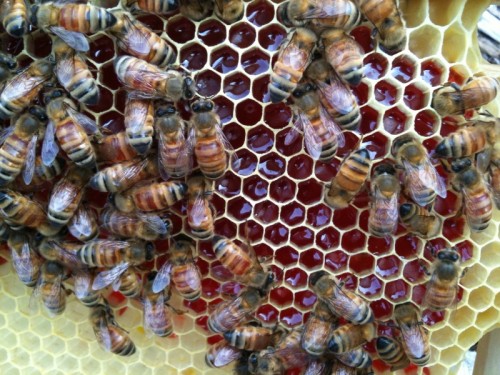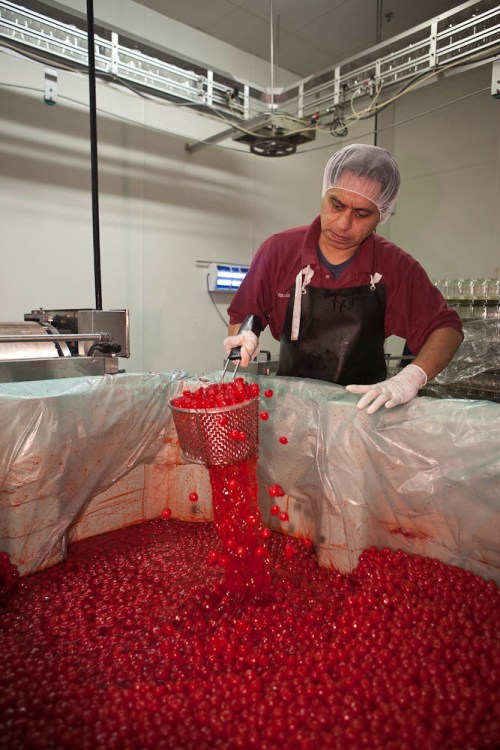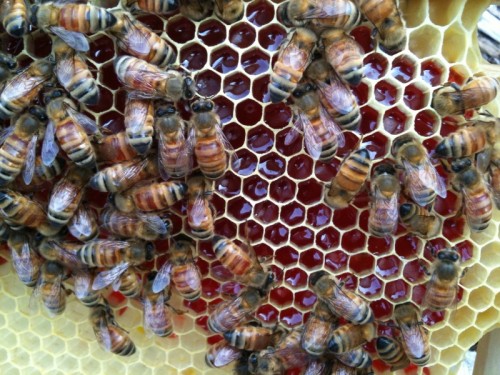 The no-longer-mysterious red bees of Brooklyn.Photo: Gita NandanA Brooklyn maraschino cherry manufacturer is going to do his part to keep the borough’s bees off the hard stuff — that is, the corn syrup used to marinate the cherries.
The no-longer-mysterious red bees of Brooklyn.Photo: Gita NandanA Brooklyn maraschino cherry manufacturer is going to do his part to keep the borough’s bees off the hard stuff — that is, the corn syrup used to marinate the cherries.
According to Vivian Wang, a beekeeper and attorney with the Natural Resources Defense Council (NRDC), the owner of Dell’s Maraschino Cherries said his phone was ringing off the hook after the tale of bees turned red by the dye in his syrup hit The New York Times front page on Monday. (Jonathan Hiskes wrote about it for us here.)
Arthur Mondella, whose family has run the factory in Brooklyn’s Red Hook neighborhood since 1948, asked for help — quickly — from Andrew Coté, president of the New York City Beekeepers’ Association.
Wang said that she was heartened by the cooperation from Mondella. Beekeeping has only been legal in New York City since April (although it was widely practiced before then), and the last thing the growing apiarist community needs is a high-profile conflict over honeybees seeking a high-fructose high. “I felt like Arthur was being very positive and proactive,” she said.
After heading out to the factory and getting a tour of the place, Wang and Coté were able to identify the point in the cherry-processing cycle where the bees are finding their opportunity. When the vats of cherries in syrup are moved from one building to another, drips of the sticky red juice can spill. It doesn’t take foraging bees long to lead their hivemates to the source, and the shrinkwrap covering the containers didn’t keep them out.
Some simple solutions might do the trick, according to a writeup of Wang and Coté’s visit in OnEarth, an NRDC publication:
Several possible ideas could help keep the bees away from the syrup. Draping the syrup bins in heavy, fabric sheets soaked in vinegar might work, Coté said. The vinegar would help mask the syrup without harming either the bees or the cherries. Other possible strategies might include building wooden and mesh “lockers” on wheels to transport the bins and placing feeders full of sugar syrup on the factory’s roof to distract the bees.
Wang said that beekeepers have to do their part as well, by making sure that bees have adequate food sources near the hive, especially in late summer and fall. (She herself has been tending NRDC’s hives 12 stories above Manhattan, atop the building that houses the organization’s offices. She thinks these bees are the highest in New York, and maybe in any city. Nicknamed “Chelsea Girls,” NRDC’s bees produced 70 pounds of honey in this, their first year.)
 A worker at Dell’s Maraschino Cherries.Photo: Harry ZernikeOne of the most disconcerting aspects of the story is that the stuff the bees make from the corn syrup — which is not true honey at all — tastes terrible. Not such great news for the beekeepers in Red Hook and on Governors Island whose hives were affected. Wang reports that Mondella offered to provide different shades of syrup so that the bees could make rainbow-hued honey. They probably won’t be taking him up on that.
A worker at Dell’s Maraschino Cherries.Photo: Harry ZernikeOne of the most disconcerting aspects of the story is that the stuff the bees make from the corn syrup — which is not true honey at all — tastes terrible. Not such great news for the beekeepers in Red Hook and on Governors Island whose hives were affected. Wang reports that Mondella offered to provide different shades of syrup so that the bees could make rainbow-hued honey. They probably won’t be taking him up on that.
As fun as the red-bee story may be, it points up some of the conflicts that are arising as growing numbers of city residents get into urban farming in an effort to be more connected with the food they eat. Keeping bees or chickens in a densely populated environment can require some creative accommodations with the neighbors.
In our conversation, Wang went on to talk about some bigger problems with the way honey is treated as a commodity.
The Food and Drug Administration actually doesn’t have a “standard of identity” for honey — a measure that many amateur and professional beekeepers have long been pushing for to protect consumers and prevent honey of questionable provenance from entering the U.S. market.
“This story is coming out at a very interesting moment, when we’re all thinking about what’s natural and pure,” said Wang.
Honey is a big and sometimes dirty business, especially in a market where prices have been going up — in part because of colony collapse disorder. Several companies that import honey into the United States were recently charged with smuggling honey into the country from China, a $40 million venture aimed at avoiding import duties and tariffs. Some of that honey was tainted with antibiotics.
That kind of problem will probably prove harder to eliminate than Red Dye #40.


